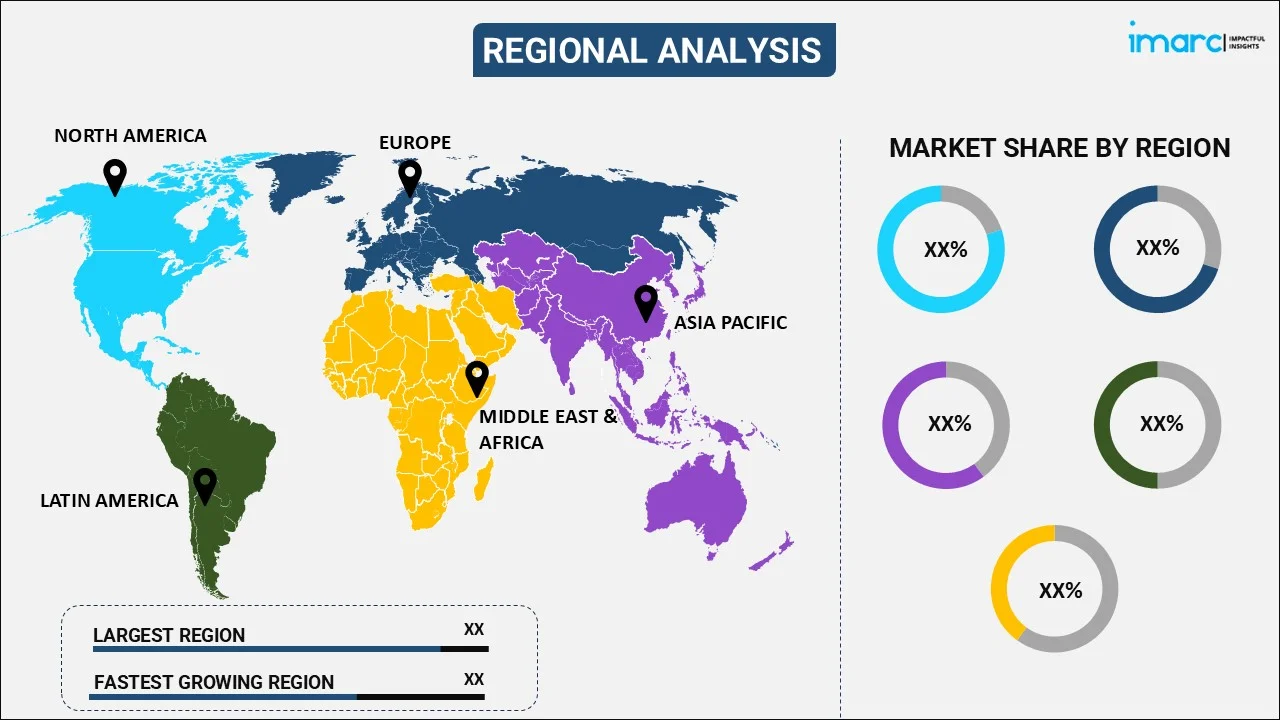
Betaine Market Report by Source (Synthetic, Natural), Product Type (Betaine Anhydrous, Betaine Monohydrate, Betaine HCl, Cocamidopropyl Betaine, and Others), End-Use Industry (Food Industry, Feed Industry, Personal Care Industry, and Others), and Region 2025-2033
Market Overview:
The global betaine market size reached USD 4.3 Billion in 2024. Looking forward, IMARC Group expects the market to reach USD 6.4 Billion by 2033, exhibiting a growth rate (CAGR) of 4.4% during 2025-2033. The increasing utilization of betaine for the manufacturing of numerous industrial products, heightened consumer awareness about sustainability and ethical sourcing, and changing individual preferences for clean-label products and natural ingredients are some of the major factors propelling the market.
|
Report Attribute
|
Key Statistics
|
|---|---|
|
Base Year
|
2024 |
|
Forecast Years
|
2025-2033
|
|
Historical Years
|
2019-2024
|
| Market Size in 2024 | USD 4.3 Billion |
| Market Forecast in 2033 | USD 6.4 Billion |
| Market Growth Rate (2025-2033) | 4.4% |
Betaine is a naturally occurring compound that plays diverse roles in biological systems. It is found in various foods, such as beets, spinach, and grains, and is also synthesized in the human body via the choline oxidation pathway. One of its primary functions is osmoregulation, helping organisms maintain cellular hydration and stability by counteracting environmental stressors. Additionally, it serves as a methyl donor during metabolic processes, participating in the conversion of homocysteine to methionine, which is crucial for DNA and protein methylation. This function contributes to the regulation of gene expression and overall cellular health. Moreover, betaine's presence has been linked to cardiovascular health, as it may help reduce homocysteine levels, thus decreasing the risk of heart disease.

The increasing utilization of betaine for the manufacturing of numerous industrial products, such as paints, detergents, coatings, and plastics, is driving the global market. Also, with heightened consumer awareness about sustainability and ethical sourcing, companies that can demonstrate responsible sourcing of betaine and its positive environmental impact might gain a competitive edge in the market. Additionally, changing consumer preferences for clean-label products and natural ingredients have influenced various industries, including food, supplements, and personal care. Betaine, being a naturally occurring compound, aligns with these preferences. Companies that can market betaine as a natural and wholesome ingredient may find increased consumer acceptance. The trend of functional beverages and fortified foods has been on the rise, driven by consumers seeking convenient ways to incorporate health-promoting ingredients into their diets. Betaine's potential health benefits, such as supporting cardiovascular health and liver function, make it a suitable candidate for inclusion in these products.
Betaine Market Trends/Drivers:
Growing Demand for Nutraceuticals and Dietary Supplements
Betaine, with its potential health benefits, has gained prominence as an essential ingredient in various supplements aimed at improving cardiovascular health, liver function, and overall metabolism. Scientific studies have highlighted betaine's role in reducing homocysteine levels, which is linked to heart disease. This connection has prompted consumers to seek out products that contain betaine to support their cardiovascular well-being. Furthermore, betaine's involvement in methylation processes offers cognitive and mood-related advantages, further enhancing its appeal in the nutraceutical sector. As consumers become more conscious of preventive healthcare and seek natural alternatives to traditional medicines, the demand for betaine-infused supplements is expected to continue its upward trajectory.
Expansion of the Animal Feed Industry
Betaine's inclusion in animal feed has been recognized for its role in enhancing animal growth, health, and productivity. It serves as an osmoprotectant, aiding animals in coping with environmental stressors such as heat and dehydration, thereby improving their overall resilience and well-being. Additionally, betaine's ability to optimize nutrient utilization and promote efficient metabolism in animals has made it a favored additive in feed formulations. Poultry, swine, and aquaculture industries particularly benefit from betaine supplementation to enhance growth rates, feed conversion efficiency, and immune responses. As global demand for animal-based protein continues to rise, the incorporation of betaine in animal feed is anticipated to remain a prominent market driver.
Advancements in Personal Care and Cosmetics
With the rising demand for natural and eco-friendly formulations, betaine's plant-derived origin aligns well with the industry's preferences. In skincare products, betaine's humectant properties help maintain skin hydration and elasticity, making it an ideal ingredient for moisturizers, cleansers, and serums. Its mildness and compatibility with various skin types contribute to its popularity in sensitive skin products. Moreover, betaine's soothing attributes make it suitable for hair care products, including shampoos and conditioners, as it can alleviate scalp irritation and enhance hair manageability. As the beauty and personal care market continues to focus on innovation and sustainable solutions, betaine's versatility and functional benefits are likely to augment its integration into a wide range of cosmetic formulations.
Key Market Segmentation:
IMARC Group provides an analysis of the key trends in each segment of the global betaine market report, along with forecasts at the global, regional and country levels from 2025-2033. Our report has categorized the market based on source, product type and end-use industry.
Breakup by Source:

- Synthetic
- Natural
Synthetic dominates the market
The report has provided a detailed breakup and analysis of the market based on the source. This includes synthetic and natural. According to the report, synthetic represented the largest segment.
Synthetic betaine production ensures consistent quality and purity, which is vital for industries such as pharmaceuticals, nutraceuticals, and cosmetics that demand standardized ingredients for their formulations. This reliability allows manufacturers to meet stringent regulatory requirements and maintain the desired attributes of their end products. Moreover, synthetic betaine can be manufactured on a larger scale compared to its natural counterparts. This scalability is particularly crucial for fulfilling the escalating demand from various industries, including animal feed, where betaine is used to enhance livestock performance and improve feed efficiency. Also, the synthetic production process allows for greater cost control and efficiency in comparison to extracting betaine from natural sources such as sugar beets or wheat bran. This cost-effectiveness has contributed to the widespread adoption of synthetic betaine, especially in industries where margins are closely monitored.
Breakup by Product Type:
- Betaine Anhydrous
- Betaine Monohydrate
- Betaine HCl
- Cocamidopropyl Betaine
- Others
Cocamidopropyl betaine dominates the market
The report has provided a detailed breakup and analysis of the market based on the product type. This includes betaine anhydrous, betaine monohydrate, betaine HCL, cocamidopropyl betaine and others. According to the report, cocamidopropyl betaine represented the largest segment.
Cocamidopropyl betaine is a favored ingredient in shampoos, body washes, liquid soaps, and facial cleansers. Its amphoteric nature allows it to function as both a foaming and conditioning agent, providing a luxurious and gentle lather while also contributing to the product's overall texture and feel. Furthermore, CAPB's compatibility with different skin and hair types, including sensitive and dry skin, makes it a sought-after ingredient for formulations aimed at catering to a diverse range of consumers. Its ability to stabilize and enhance the performance of other ingredients in personal care products further solidifies its importance in cosmetic formulations. In addition to personal care, CAPB finds application in household and industrial cleaning products. Its excellent surfactant properties make it effective at removing dirt, grease, and grime, which is essential in various cleaning solutions. Its eco-friendly and biodegradable nature aligns with the growing demand for environmentally conscious cleaning products.
Breakup by End-Use Industry:
- Food Industry
- Feed Industry
- Personal Care Industry
- Others
Personal care industry dominate the market
The report has provided a detailed breakup and analysis of the market based on the end-use industry. This includes food industry, feed industry, personal care industry and others. According to the report, the personal care industry represented the largest segment.
Betaine's moisturizing and humectant properties contribute to its popularity in skincare formulations. Its ability to retain and regulate moisture helps maintain skin hydration and suppleness, which is crucial in products such as moisturizers, serums, and lotions. This makes betaine a preferred ingredient, particularly in formulations targeting dry or sensitive skin. In hair care, betaine's conditioning properties enhance manageability and shine, making it a desirable component in hair conditioners and treatments. Additionally, its ability to reduce static and frizz contributes to its effectiveness in hair products, particularly in formulations catering to specific hair concerns. Furthermore, as the personal care industry continues to emphasize innovation, betaine's adaptability and compatibility with various formulations make it an attractive ingredient for product development. Its stability in different pH ranges and compatibility with other ingredients enable formulators to create unique and effective formulations that meet consumer demands.
Breakup by Region:

- North America
- United States
- Canada
- Asia Pacific
- China
- Japan
- India
- South Korea
- Australia
- Indonesia
- Others
- Europe
- Germany
- France
- United Kingdom
- Italy
- Spain
- Russia
- Others
- Latin America
- Brazil
- Mexico
- Others
- Middle East and Africa
North America exhibits a clear dominance, accounting for the largest betaine market share
The market research report has also provided a comprehensive analysis of all the major regional markets, which include North America (the United States and Canada); Asia Pacific (China, Japan, India, South Korea, Australia, Indonesia, and others); Europe (Germany, France, the United Kingdom, Italy, Spain, Russia, and others); Latin America (Brazil, Mexico, and others); and the Middle East and Africa. According to the report, North America accounted for the largest market share.
North America boasts a robust and well-developed industrial landscape, encompassing various sectors where betaine finds substantial applications. From personal care and cosmetics to animal feed and pharmaceuticals, the region's diverse industries have integrated betaine into their products and processes, contributing to a consistently high demand. Moreover, the region's emphasis on research and development, coupled with a culture of innovation, has paved the way for the integration of betaine into novel formulations and applications. The United States, in particular, is home to several research institutions and companies focused on exploring the potential of betaine across industries, further fueling its growth and utilization. Furthermore, the stringent regulatory standards and quality control measures in North America ensure that products containing betaine meet the highest safety and quality criteria. This has impelled consumer trust and confidence in the ingredient, further stimulating its adoption in various applications.
Competitive Landscape:
Several companies are investing in research and development to explore new applications, formulations, and derivatives of betaine. They aim to enhance its functional properties, improve its compatibility with other ingredients, and develop specialized variants for specific industries such as personal care, animal feed, and pharmaceuticals. Also, betaine manufacturers are continuously innovating by introducing new products that cater to evolving consumer preferences. Additionally, numerous companies are expanding their market presence by establishing partnerships, collaborations, and distribution agreements with other players in the industry. This helps them to reach a broader customer base and tap into new markets, both domestically and internationally. Major companies are focusing on creating tailor-made solutions for specific industries. Companies are also engaging in marketing campaigns to educate consumers and industrial clients about the benefits of betaine. They emphasize its various applications, potential health advantages, and its role in enhancing product performance.
The report has provided a comprehensive analysis of the competitive landscape in the market. Detailed profiles of all major companies have also been provided. Some of the key players in the market include:
- United Sugars Corporation
- AMINO GmbH
- Associated British Foods plc.
- BASF SE
- The Dow Chemical Company
- Evonik Industries AG
- Kao Group
- Merck KGaA
- Nutreco N.V.
- Solvay SA
- Stepan Company
Recent Developments:
- In September 2022, Stepan Company announced the completion of its acquisition of the surfactant business and associated assets of PerformanX Specialty Chemicals, LLC. The acquisition includes intellectual property, commercial relationships, and inventory.
- In September 2022, BASF announces innovation partnership with RiKarbon on emollients derived from bio-waste.
- In July 2022, Evonik signed an agreement to sell its whole betaines business, to specialty chemicals company Kensing LLC. This divestment marks the next stage of the transformation of Evonik’s Care Solutions business line to become a System Solutions provider for the personal care and cleaning industries.
Betaine Market Report Scope:
| Report Features | Details |
|---|---|
| Base Year of the Analysis | 2024 |
| Historical Period | 2019-2024 |
| Forecast Period | 2025-2033 |
| Units | Billion USD |
| Scope of the Report | Exploration of Historical Trends and Market Outlook, Industry Catalysts and Challenges, Segment-Wise Historical and Predictive Market Assessment:
|
| Sources Covered | Synthetic, Natural |
| Product Types Covered | Betaine Anhydrous, Betaine Monohydrate, Betaine HCL, Cocamidopropyl Betaine, Others |
| End-Use Industries Covered | Food Industry, Feed Industry, Personal Care Industry, Others |
| Regions Covered | Asia Pacific, Europe, North America, Latin America, Middle East and Africa |
| Countries Covered | United States, Canada, Germany, France, United Kingdom, Italy, Spain, Russia, China, Japan, India, South Korea, Australia, Indonesia, Brazil, Mexico |
| Companies Covered | United Sugars Corporation, AMINO GmbH, Associated British Foods plc, BASF SE, The Dow Chemical Company, Evonik Industries AG, Kao Group, Merck KGaA, Nutreco N.V., Solvay SA, Stepan Company, etc. |
| Customization Scope | 10% Free Customization |
| Post-Sale Analyst Support | 10-12 Weeks |
| Delivery Format | PDF and Excel through Email (We can also provide the editable version of the report in PPT/Word format on special request) |
Key Benefits for Stakeholders:
- IMARC’s industry report offers a comprehensive quantitative analysis of various market segments, historical and current market trends, market forecasts, and dynamics of the betaine market from 2019-2033.
- The research report provides the latest information on the market drivers, challenges, and opportunities in the global betaine market.
- The study maps the leading, as well as the fastest-growing, regional markets. It further enables stakeholders to identify the key country-level markets within each region.
- Porter's five forces analysis assist stakeholders in assessing the impact of new entrants, competitive rivalry, supplier power, buyer power, and the threat of substitution. It helps stakeholders to analyze the level of competition within the betaine industry and its attractiveness.
- Competitive landscape allows stakeholders to understand their competitive environment and provides an insight into the current positions of key players in the market.
Key Questions Answered in This Report
The global betaine market was valued at USD 4.3 Billion in 2024.
We expect the global betaine market to exhibit a CAGR of 4.4% during 2025-2033.
The rising demand for betaine in the cosmetics and personal care industry, owing to its enhanced water retention and moisturizing properties, is primarily driving the global betaine market.
The sudden outbreak of the COVID-19 pandemic had led to the implementation of stringent lockdown regulations across several nations, resulting in the temporary halt in numerous production activities for betaine.
Based on the source, the global betaine market can be segmented into synthetic and natural. Currently, synthetic holds the majority of the total market share.
Based on the product type, the global betaine market has been divided into betaine anhydrous, betaine monohydrate, betaine HCl, cocamidopropyl betaine, and others. Among these, cocamidopropyl betaine currently exhibits a clear dominance in the market.
Based on the end-use industry, the global betaine market can be categorized into food industry, feed industry, personal care industry, and others. Currently, personal care industry accounts for the largest market share.
On a regional level, the market has been classified into North America, Asia-Pacific, Europe, Latin America, and Middle East and Africa, where North America currently dominates the global market.
Some of the major players in the global betaine market include United Sugars Corporation, AMINO GmbH, Associated British Foods plc, BASF SE, The Dow Chemical Company, Evonik Industries AG, Kao Group, Merck KGaA, Nutreco N.V., Solvay SA, and Stepan Company.
Need more help?
- Speak to our experienced analysts for insights on the current market scenarios.
- Include additional segments and countries to customize the report as per your requirement.
- Gain an unparalleled competitive advantage in your domain by understanding how to utilize the report and positively impacting your operations and revenue.
- For further assistance, please connect with our analysts.
 Request Customization
Request Customization
 Speak to an Analyst
Speak to an Analyst
 Request Brochure
Request Brochure
 Inquire Before Buying
Inquire Before Buying




.webp)




.webp)












